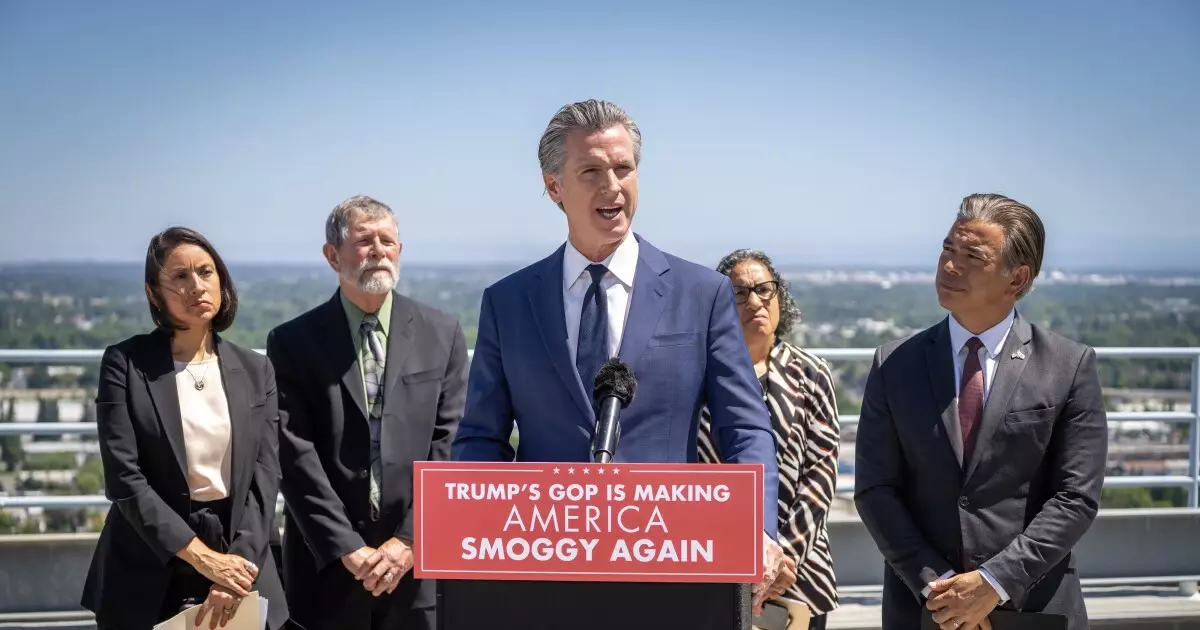The state of California has long prided itself on being at the forefront of environmental policy, adopting stringent vehicle emission regulations that often exceed federal standards. These measures were not merely reactive; they were visionary initiatives aimed at combating pollution and preparing for a future where electric vehicles (EVs) dominate the roads. However, the anticipated legal showdown between California and the Trump administration over new legislation aimed at dismantling these hard-won regulations reveals deeper issues about governance, environmental responsibility, and federalism. This battle is critical, not just for California but for the entire nation.
California vs. Federal Authority: A Question of Legitimacy
California’s threat of litigation marks its 23rd confrontation with the Trump administration, highlighting the escalating friction between state and federal governance. Attorney General Rob Bonta’s assertion that the federal actions are “shortsighted and illegal” is emblematic of a growing discontent among states that prioritize the well-being of their citizens over partisan politics. The current federal administration’s inclination to revoke California’s regulatory waivers is a blatant maneuver that undermines decades of legislative precedent dating back to the Clean Air Act of 1970.
The irony is not lost on observers: The Democrats’ historical lineage links them to environmental stewardship—yet, the actions taken by the Trump administration seem calculated to pander to populist sentiments at the expense of a sustainable future. This is more than just a legal matter; it is a question of moral leadership. Governor Gavin Newsom’s denunciation of Congress’s actions as a bid to make “America smoggy again” underscores the dire implications of potentially rolling back essential environmental protections. The stakes extend far beyond clean air; they directly influence public health and the economy.
The Rhetoric of Partisanship
Newsom’s remarks regarding the “red team versus blue team” dynamic highlight the toxic partisanship that has engulfed environmental policy discussions. Such framing of issues fosters divisiveness and often undermines the collaborative spirit that has historically driven significant environmental legislation. The environmental challenges we face today, including climate change and health impacts from pollution, demand a bipartisan approach. The insistence that the opposing side is merely acting out of political expedience detracts from constructive discourse and jeopardizes the collaborative efforts necessary to tackle these pressing issues.
It’s essential to draw attention to historical precedents where bipartisan support for environmental regulations existed. The legacy of Republican leaders, such as Richard Nixon and Ronald Reagan, who championed stronger emissions standards, stands in stark contrast to the current GOP leadership’s stance on the issue. This negation of history shows how deeply entrenched political ideology can overshadow the broader vision for community and environmental health.
Public Health at Risk
Reports indicate that California still harbors some of the nation’s most polluted cities, with millions living in areas that don’t meet basic air quality standards. While California has made considerable strides—achieving a 20% reduction in greenhouse gas emissions since 2000—the ongoing struggle against federal rollbacks poses both immediate and long-term health risks. The possibility of rolling back emissions regulations threatens to aggravate public health crises, particularly in vulnerable populations that already suffer from high rates of asthma and cardiopulmonary disease.
As Governor Newsom stated, these decisions represent a “bad day for our kids and clean air.” The pediatric implications of poor air quality cannot be overstated; children are particularly sensitive to environmental contaminants. If regulations loosen, we may witness a significant decline in the air quality improvements made over decades, leaving future generations to confront the consequences of shortsighted governance.
The Economic Argument: A Pathway to Leadership
However, the repercussions extend beyond health; they also encompass economic implications. California’s stringent environmental regulations have positioned it as a leader in the electric vehicle market. According to Newsom, the Trump administration’s antagonism toward state-led environmental efforts compromises America’s competitiveness against countries like China, which are aggressively investing in green technologies. If California cannot maintain its status as an innovation hub for EVs, the nation could miss out on substantial economic opportunities.
Ultimately, this confrontation serves as a cautionary tale—one that warns against allowing partisanship to dictate policy direction. It reveals that environmental responsibility, public health, and economic sustainability are interconnected goals that require a harmonious approach. In this age of climate urgency, it is crucial that lawmakers transcend political divides and work collaboratively for a cleaner, healthier future.

